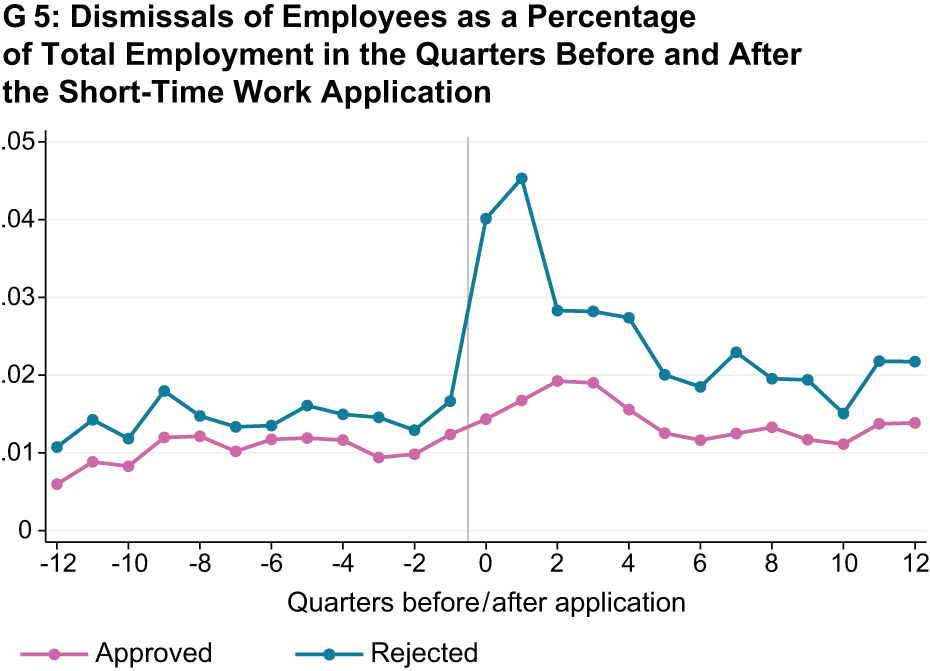Does Short-Time Work Prevent Dismissals?
- Labour Market
- KOF Bulletin
Short-time work schemes are intended to prevent unemployment during recessions. So far, very few studies have provided evidence of the desired effect. A current KOF study now shows that the Swiss short-time work programme in the years 2009 to 2015 effectively prevented lay-offs. The savings in unemployment benefits are likely to have covered the direct expenses associated with short-time work compensation payments.

During the global financial and economic crisis in the period from 2007 to 2009, many industrialised countries suffered a severe slump in economic performance. Short-time work programmes were among the popular measures intended to stave off imminent mass unemployment. In 2009 alone, Switzerland spent CHF 1.1 billion on short-time work compensation payments. Short-time work schemes are suitable for companies facing a temporary decline in demand for their goods and services. The scheme allows them to introduce a temporary reduction of working hours. The employees concerned receive compensation for the lost income from the unemployment insurance fund.
The principal aim of short-time work programmes is the prevention of lay-offs and hence unemployment. However, the effectiveness of such programmes is in doubt. There is a risk that the programmes merely postpone dismissals instead of preventing them. On top of this, there is a risk that short-time work compensation may be used for jobs that would have been preserved even without government support. Most research studies have come to sobering conclusions regarding the effectiveness of short-time work – especially earlier studies on short-time work schemes in Switzerland.
Short-time work significantly reduces lay-offs
In a new KOF study, Daniel Kopp und Michael Siegenthaler investigated whether the Swiss short-timework programme prevented unemployment in the years 2009 to 2015. To analyse this question, the authors linked the data of all Swiss companies that had applied for short-time work compensation in the years 2009 to 2014 with the unemployment insurance data of the Swiss State Secretariat for Economic Affairs (SECO) and the employment statistics of the Swiss Federal Statistical Office (FSO).
The authors’ analysis clearly shows that short-time work in the years 2009 to 2015 contributed to the prevention of dismissals. This central result is reflected in Graph 5. It shows the number of individuals laid off in a specific quarter who subsequently registered as unemployed with the regional employment offices. This number is expressed as a percentage of total employment at the former employer. According to the graph, enterprises whose short-time work application was rejected laid off over 4% of their staff in each of the subsequent two quarters, while the equivalent percentage in the quarters before the application was around 1%. Companies whose applications were approved showed a much smaller increase in dismissals (from 1% to approx. 2%).

The study has yielded two further interesting results. Firstly, companies that received a rejection laid off more employees even two to three years after the application than companies whose application was approved. This suggests that short-time work not only postpones dismissals but effectively prevents them in the long run. Secondly, the trend in the frequency of dismissals was similar for both groups in the three years before they applied for the short-time work programme, indicating that the two groups are comparable.
The above descriptive results are supported by the authors’ statistical analyses. According to their estimates, in the three years following a company’s application, short-time work reduces the number of dismissals by at least 10% of the original employment level. Some estimates even indicate that the impact is twice as high. In this context, short-time work predominantly safeguards the jobs of employees with mandatory school leaving certificates or vocational qualifications.
Unemployment insurance fund (appears to be) unaffected
Based on their estimates, the authors also concluded that short-time work led to savings in unemployment benefits of CHF 108,000 to 200,000 per short-time work case. This represents a significant financial benefit for the unemployment insurance fund. In fact, these savings could be sufficient to cover the entire costs arising to the fund due to short-time work, i.e. short-time work compensation payments.
Contact
KOF Konjunkturforschungsstelle
Leonhardstrasse 21
8092
Zürich
Switzerland
Contact
KOF Konjunkturforschungsstelle
Leonhardstrasse 21
8092
Zürich
Switzerland